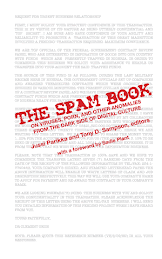The origin of my interest was through a Finnish "talent" or actually a world record attempt TV-show, a low-budget show with completely average Finns trying to break records that probably never even existed. In terms of Youtube-

popularity, one of them broke the record all right: the so-called "Cola-Olli." For the first time, he was featured in the programme in November 2006 when he tried to drink 1,5 litres of Coca Cola in approx. 45 seconds. Well, most of Finland knows by now that the guy never made it, and he had to interrupt the "test" after some two glasses with the almost by now legendary words: "ei pysty, liian hapokasta" -- "can't do this, too acid." Cola-Olli became an instant ridiculed hit on Youtube (poor guy), which did not stop him from becoming a celebrity. Apparently, he was asked to perform on festivals and reappeared in the same TV-show later on only to lose a Cola-drinking duel with another talented young man.
In any case, we ended up talking with my friend Pasi Väliaho about Cola-Olli as an indexical character of the post-Fordist culture of "creativity." The quotation marks around the word creativity are much needed. What such events of TV-shows are incidental of, is a culture of paradoxical loops of failure and insignificance, and we never reached a conclusion whether Cola-Olli was to be remembered for his complete failure or because that his attempt had no significance anyway. (Of course, as Milla reminded me, one of the contexts for Cola-Olli are the various eating competitions etc. especially in the US, that work as a certain kind of a potlach-culture, or turning the act of consumption into a celebrated talent when you stuff your mouth with a ridiculous amount of eggs, butter and whatever food-like substance!).
As a mock up of any celebration of cultures of creativity, or creative industries, or in a tongue in cheek fashion of Paolo Virno's idea of the generic capacities of the human being (such as communication, language, creativity etc.) as the defining biopolitical engine for current culture, Cola-Olli was phenomenal. How about such TV-shows and acts that carry no kind of talent -- more of an incapacity for anything, an acclaimed talent for something that is in any way easily negligible. Why should we care if someone can drink 1,5 litres of coke in 45 seconds, or if someone has a good attempt of being a good unicycling act (Britain's Got Talent) or if someone thinks they can dance like Michael Jackson (BGT again) is worthwhile paying attention to. With such examples, and the whole concept, it becomes much more interesting to start thinking about the framing modes of attention, the attention economy, of such acts, than any potential skill, lack of skill, or interest in peculiar talents. If Musil wrote about the The Man Without Qualities as an emblematic figure of modernity, surely The Man Without Talent in this supposed culture of creativity is an updated version of the central character which is the engine for the discourse of "everyday talent." I am not in any way agreeing with the silly elitism of people such as Andrew Keen ("The Cult of the Amateur"), but just proposing how such examples are voicing another kind of a viewpoint to the creative industries.
Quite often we find the reference to the logic of publicity and visibility as the defining force behind such programmes - the Warholian idea of every person having his or her 5 minutes of fame. However, perhaps it has to do as much with a rethinking of the whole notion of creativity and actually revealing something about the post-avantgarde sphere of Creative Cultures that we are dealing with. I am here reminded of Maurizio Lazzarato's talk at Art and Immaterial Labour Symposium in London, January 2008. To really briefly summarize, Lazzarato pointed towards the key paradigmatic "values" of modernity: freedom, heterogeneity, difference and deviance, all capacities or "talent" of the artist. However, to put it shortly, such skills or values are not restricted to the artist anymore but are distributed across the whole of the social body which in Lazzarato's discourse can be connected to societies of security (in the manner suggested by Foucault). Anyhow, Lazzarato tracks the genealogy of this idea through Duchamp and Kafka. For example Duchamp's readymade is emblematic of concerns that could be relevant for all the "talent shows" of people with little traditional talent in the manner of how already "the readymade does not involve any virtuosity, technique or particular know-how, so it 'desacralizes' and deprofessionalizes the artist's function...". (Lazzarato, in Radical Philosophy 149, p. 27). Instead of the idea of the active, creative genius, we have the act of doing pretty much nothing; "Acting at the minimum", as Lazzarato calls it; "doing nothing", he writes, as the "refusal to accomplish what is asked of you, whether it be the passivity of the worker or the activity of the artist...".
Lazzarato's larger point relates to demonstrating how the act of the artist is not anymore set against work. The wider field of work and creativity have been renegotiated in a new regime of proximity. Indeed, such aesthetic practices and discourses should be also seen as productions of subjectivity, which is the generalization of some of the banality in avant-garde techniques to the general culture of creativity. (As a footnote: in his recent book Le gouvernement des inégalites Lazzarato talks about the regime of neoliberalism acting through the wider field of the social; intervening through a promotion of creativity and multiplicity in order to create the aspiration for entrepreneurship, the personalized "human capital" of each and every one's powers of differentiation.)
The truth about Creative Industries is the grey banality of the everyday life at an ad-agency, or a games house where an increasing amount of the jobs has to do with administration and for example answering maintenance calls. (In some games houses apparently the figure is something like 25 % of people hired for creative design, 75 % for admin such as support lines.) Naturally this applies to universities as well, where the amount of admin is increasing in terms of personnel but also in terms of duties of the supposedly creative classes such as lecturers and researchers.
In this context, Cola-Olli is not so much a loser than only an emblematic figure of the middle-classes trying to find that last spark of uniqueness within admin cultures of creativity. Beyond talent, performing the banality of the everyday life in creative industries. He is the "readymade" performer of current culture obsessed with finding talent in every corner of life. And to be fair, if pressed with the question of what would be my creative talent, I would remain speechless. I could not perform any better than Cola-Olli in drinking Coke, or the Stavros Flatley family doing their mock Greek/Irish step dancing, nor could I sing. To put it in lyrics by Morrissey and the Smiths: " She said: I know you and you cannot sing / I said: that's nothing, you should hear me play the piano." Hence, I have to remain academic swamped with loads of admin on my desk.








No comments:
Post a Comment